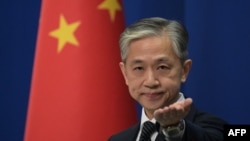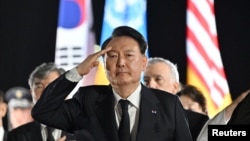South Korea's increasingly outspoken stands on issues including Taiwan and the South China Sea are raising tensions between Beijing and Seoul.
Most recently, South Korea pushed back at China's criticism of Taiwan's participation at the Summit for Democracy that wrapped up in Seoul on Wednesday. Taiwan's Minister of Digital Affairs Audrey Tang spoke virtually on Monday, addressing the risks posed by cyberattacks to elections worldwide.
The event was held to "enhance democracy" and "not meant to target a particular country," South Korean Foreign Ministry spokesperson Lim Soo-suk said at a news briefing on Tuesday. South Korea's one-China policy remains unchanged, Lim continued.
Chinese Foreign Ministry spokesperson Lin Jian had said Monday at a news conference that Beijing "firmly opposes the ROK [Republic of South Korea] inviting the Taiwan authorities" to the event.
At an earlier news briefing on March 12, Chinese Foreign Ministry spokesperson Wang Wenbin urged South Korea to refrain from taking a position against China on the South China Sea and to "avoid adding unnecessary burden" to their bilateral relations.
He went on to say Seoul "has changed its prudent and neutral position that it had adhered to for years and alluded to or blamed China on the South China Sea issues on multiple occasions."
South Korea's Lim had said at a press briefing on March 7 that Seoul was "deeply concerned" about Chinese coast guard ships using water cannons against a Philippine vessel and that the action "heightens tensions" in the region.
Lim's remarks were welcomed in Taiwan, where Foreign Ministry spokesperson Jeff Liu told VOA via email this week that the ministry expresses "its appreciation and gratitude" to countries such as South Korea for sharing their concerns over the situation in the South China Sea.
He continued, Taiwan "supports freedom of navigation and overflight in the South China Sea."
Regarding Taiwan's participation at the summit, Liu told VOA it has become "China's standard response" to oppose Taiwan whenever it is "active, prominent, acknowledged, or honored internationally."
China considers the self-governing island of Taiwan as its own territory.
Patrick Cronin, chair for Asia-Pacific Security at Hudson Institute, said China wants to remind Seoul not to become "too assertive" in its remarks, but that Beijing has learned to avoid imposing pressure "it knows will be counterproductive."
He recalled that when South Korea installed the U.S. Terminal High-Altitude Area Defense system (THAAD) in 2017, Beijing responded by suspending Chinese group tours to South Korea and closed South Korean Lotte supermarket chains in China.
Cronin pointed out that the Yoon administration in Seoul has declared its wish to play a more central role in the global struggle for freedom and value-based diplomacy.
In the preface to South Korea's National Security Strategy issued in June 2023, President Yoon Suk Yeol said, "As a global pivotal state ground in the spirit of freedom and solidarity, the Republic of Korea endeavors to actively address the rapidly evolving security environment."
Yoon has been more vocal about defending Taiwan and opposing Chinese assertive behavior in the South China Sea than was his predecessor, Moon Jae-in.
In an interview with Reuters ahead of an April 2023 state visit to Washington, Yoon expressed his opposition to attempts to use force to change the status quo between China and Taiwan. China's Vice Foreign Minister Sun Weidong said Yoon's remarks were “totally unacceptable” a few days later.
In November, before Yoon made a state visit to London, he emphasized the importance of maintaining a rules-based order in the South China Sea and peace and stability in the Taiwan Strait. Those remarks appeared in an interview with The Telegraph, a British newspaper.
Daniel DePetris, a fellow at the Washington-based think tank Defense Priorities, said Seoul's verbal defense of the Philippines is "notable" not only because of what it says about its relations with China but what it says about smaller powers around China.
In an email to VOA on Tuesday, he said Seoul's remarks show that "small and mid-tier states along China's periphery are deepening their own security political relations to better balance Chinese power."
Robert Manning, a senior fellow at the Stimson Center's Reimagining U.S. Grand Strategy Project, told VOA on Wednesday via email that China's remarks urging Seoul to avoid adding unnecessary burden to their bilateral ties "appears a thinly veiled threat in response to the consistent pro-Western posture of the Yoon administration on not just the South China Sea, but global issues such as Ukraine."
Jingxun Li from VOA's Mandarin Service contributed to this report.













